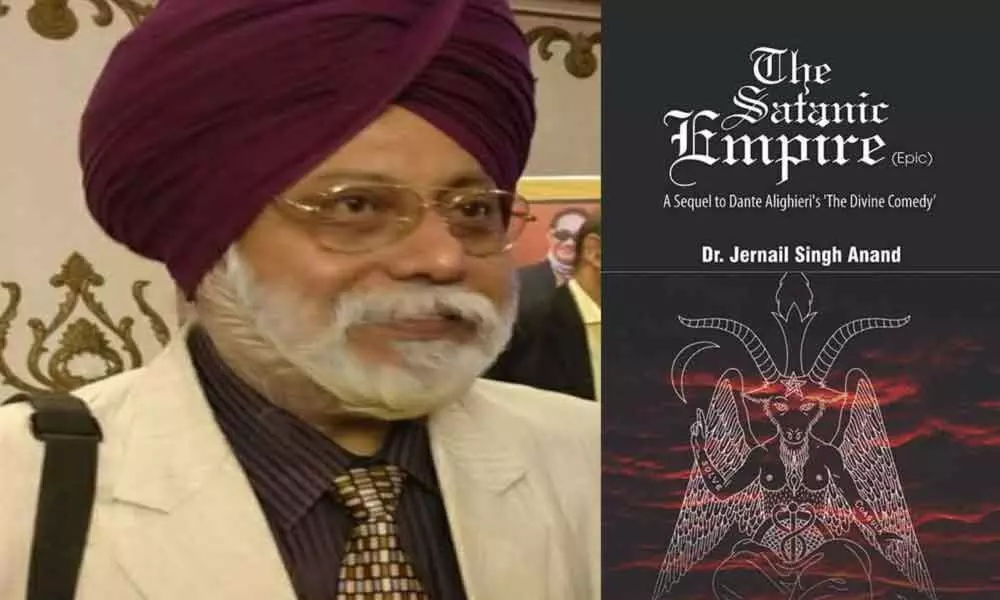Live
- BJP releases ‘charge sheet’ against BJD govt
- District Nodal Officer Venkataramana announced the intermediate results
- She team that stopped child marriages
- Medical devices sector needs separate rules, says industry body AiMeD
- Andhra Paper declares lockout
- Opposition INDIA bloc working on 'one year, one PM' formula: PM Modi
- Delhi HC quashes FIR for outraging woman's modesty, orders man to assist Traffic Police for a month as settlement
- 'Apologise to families of farmers who committed suicide in Vidarbha', Amit Shah dares Sharad Pawar
- SC Collegium recommends appointment of a permanent judge in Chhattisgarh HC, extension of term of two judges
- U20 Men's football nationals: Telangana, Sikkim earn full points with easy win
Just In
Dr Jernail Singh Anand ranks among the leading poets of the world today: A case for magic realism


Dr Jernail Singh Anand ranks among the leading poets of the world today.
Dr Jernail Singh Anand ranks among the leading poets of the world today. However, it is his epical works on which his reputation as a poet of substance finally rests. His first epic Geet: The Unsung Song of Eternity brings out the homo sacer in him. However, the quest for a viable alternative to the chaotic life patterns continues in his latest epic The Satanic Empire too, which by most charitable estimates, is a disturbing book. Disturbing because it tries to touch the most sacred chords of man's life, questions his belief-systems, and rejects most of the myths which instead of supporting life, are leading man into the mine-fields of crime and sin.
Epics are works of literature which profile extraordinary men and women, belonging to a time beyond living memory, engaged in emotional and moral strife, trying to give a shape to the moral universe for their descendants. The participation of divine figures provides the timeless story a surreal background in which an action which is amiss meets horrible fallout. Implanting such an epic on modern audience, where there are no extraordinary men and women, and in which divine figures too are ruled out, makes a case for magic realism, in which, the real and the surreal blend to make a holistic statement about human situation.
In this world obsessed with fiction, Anand appears to be the solitary figure who has taken up the epic genre. In his latest work, 'The Satanic Empire', the author constructs a bridge between Dante's 'The Divine Comedy' written in the 14th century, and the 21st century, focusing on the bitter revelation that the gospel has disintegrated over the centuries, and finally, the entire civilization has been imperialised by the greatest colonizer of the world: Satan.
A piece of literature is expected to weave the past into its fold, comment on the present scenario in order to re-structure a viable future. Anand's writings are marked with this higher consciousness and engage in a meaningful dialogue with eternity. The Satanic Empire attempts a reappraisal of the civilized world, which has missed spiritual healing by the masters of religions, as well as by great philosophers, about which Dr. Anand, in his book 'Beyond Life Beyond Death'{2001] says:
"Prophets come, prophets go,
Leaving the darkness denser below."
The book in hand is marked with poetry of a high order commensurate with the elevated subject of the epical work, about which Anand states in the Invocation:
"Invest me with powers of the minstrel
Who retains the grit
To tell the truth,
Lead it might to his own decimation.
Before I disintegrate,-
Let me once again put across to the world
The gospel true
That flowed through Christ …"
The book is divided into three parts, Inferno, Purgatory and Paradiso which are further subdivided into 12 cantos. It has Dante as a character and Sage who represents the poet. Chorus appears time and again to chip in with its comments. The participation of divine figures like Narad Muni, spirits of the saints, sages, and literary figures like Oedipus, Faustus, - all combine to lend this work an unearthly ambience, though not exactly divine.
'The Satanic Empire' is not at all a religious text; rather, the book imbibes the spirit of all religions, rejects formalism and fanaticism, and embraces humanity as its true religion. The most disturbing thing is that Satan succeeds in drugging Faustus with illusions of grandeur, and he is forbidden to love. Love is at the centre of the vision of this work, as Knowledge was at the centre of Milton's great epic. Satan wants to bastardize the whole human civilization by ensuring that people stop loving and have kids out of a spurious marriage.
The parting advice of the saints and sages once again rings up the central issues that inform this work all through and it appears it is again Gita's philosophy of 'Karma' which is reasserted to guide man out of his predicament. In all, it takes cognizance of the twisted psycho-religious balance of the world, tilting more towards barbarism than a 'brave new world' of impossible dreams:
"You rush to religious shrines,
Dotted with booby traps and explosive mines"
In conclusion, J.S Anand's The Satanic Empire is definitely a masterpiece in Indian Poetry in English. He has adroitly universalised Dante's Christian theology of the Mediaeval Age in the minds of Modern men. This poetical allegory ends with a note of robust optimism. Anand envisions the past, the present, the future, the Time arrested and the Time eternal in The Satanic Empire. J.S. Anand's perception of the cosmos of the universe is the hallmark of his creative imagination.

© 2024 Hyderabad Media House Limited/The Hans India. All rights reserved. Powered by hocalwire.com






